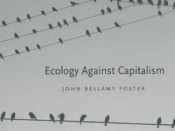“Capitalism and Ecology: The Nature of the Contradiction,” Monthly Review vol. 54, no. 4 (September 2002), pp. 6-16. DOI: 10.14452/MR-054-04-2002-08_2
The social relation of capital, as we all know, is a contradictory one. These contradictions, though stemming from capitalism’s internal laws of motion, extend out to phenomena that are usually conceived as external to the system, threatening the integrity of the entire biosphere and everything within it as a result of capital’s relentless expansion. How to understand capitalism’s ecological contradictions has therefore become a subject of heated debate among socialists. Two crucial issues in this debate are: (1) must ecological crisis lead to economic crisis under capitalism?, and (2) to what extent is there an ecological contradiction at the heart of capitalist society?

